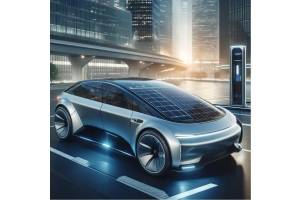In recent years, China has been at the forefront of sustainable development initiatives, leading the global shift towards sustainable transportation and reduced carbon emissions. Within both domestic and international realms, the electric vehicle industry has been one of the most outstanding and progressive sectors, with leading global technology levels in whole vehicles, batteries, motor drive systems, connected vehicle scale, and charging infrastructure.
According to a 2023 report by Mordor Intelligence, the industry's electric vehicle sales exceeded 6.8 million units, accounting for more than half (54%) of global electric vehicle sales. Moreover, the report predicts that by 2024, the industry's market value will reach $305.57 billion and will double by 2029.
The development of China's new energy vehicle industry is highly anticipated, and the automotive market is accelerating its transformation and reshaping, with both opportunities and challenges for the industry's development.
Unprecedented Development Opportunities
China has always prioritized the promotion of electric and new energy vehicles as key to combating pollution and reducing dependency on fossil fuels. To achieve carbon neutrality and peak carbon emissions, the proportion of fossil energy will gradually decrease, while clean energy will become the main source of energy.
With increasing consumer awareness of environmental issues and government incentives for electric vehicles, sales are likely to surge. Domestic and international automakers are expected to launch new models and continuously expand their electric vehicle product lines to meet the growing market demand.
Advancements in battery technology, such as solid-state technology, higher energy density, and faster charging, are expected to improve electric vehicle performance, range, and affordability. On-board high-voltage power supplies and charging pile equipment are key foundational equipment for the continued development of new energy vehicles. The market size for these components will expand with new energy vehicle sales, and the rapid development of the downstream new energy vehicle industry will provide a broad development space for the new energy vehicle high-voltage power supply industry.
Furthermore, to alleviate concerns about charging availability, investment in urban and rural charging infrastructure has been increased, driven by government incentives. This includes public stations, rapid charging networks, and home solutions.
The Chinese government is expected to expand various policies supporting the development of new energy vehicles in the near future. These include financial incentives for purchasing and manufacturing electric vehicles, regulations promoting clean energy vehicles in public fleets, and measures addressing battery recycling and sustainable manufacturing practices.
As cooperation among government agencies, automakers, and tech companies increases, along with further technological innovation, these initiatives may accelerate the pace of innovation, helping China maintain its global leadership position in the electric vehicle market.
At the heart of every electric vehicle is a complex network of integrated circuits (ICs), coordinating the seamless operation of various components and subsystems. From managing battery performance and optimizing energy efficiency to controlling motor functions and enabling advanced driver assistance systems (ADAS), ICs play a crucial role in unlocking the full potential of electric mobility.
With the rapid growth of China's electric vehicle market in recent years, demand for integrated circuits has soared. Manufacturers are racing to develop cutting-edge semiconductor solutions that offer high performance, reliability, and efficiency. This surge in demand highlights the key role of ICs in driving innovation and shaping the future of transportation in China and beyond.
Significant Challenges That Cannot Be Ignored
The booming new energy vehicle industry in China faces challenges amidst its exponential growth:
-
Internationally, countries need to jointly build a smooth and stable global industrial and supply chain, further uphold fair and transparent economic and trade rules, and better promote the construction of a community with a shared future for humanity.
-
Domestically, it's imperative to strengthen the research and development of automotive chips and break through key technologies such as basic software to continuously improve the adaptability, safety, and charging convenience of new energy vehicles in cold environments.
-
Additionally, the unbalanced and insufficient development of the domestic market cannot be ignored. The fierce market competition, the need to enhance corporate support and guarantee capabilities, and the shortage of talent are issues that urgently need to be addressed.
Independent Distributors Aid the Development of the Electric Vehicle Industry
Against the backdrop of current international turmoil, the complexity of supply chains is increasing, and global supply chain crises are emerging frequently, exacerbating the risk to the automotive supply chain. The traditional "chain" supply chain model no longer meets the needs of modern automotive manufacturing. Therefore, the automotive industry supply chain must find new development models, gradually moving towards globalization, localization, efficiency, and diversification.
Independent distributors, leveraging their unique position, provide support to customers and drive the development of the electric vehicle and new energy vehicle ecosystem:
- Diversified Supply Chain Support: Independent distributors typically have access to a variety of supply chain resources, enabling them to procure a wide range of electric vehicle components.
NOVA Technology(HK) Co., Ltd has established a vast and close-knit supply chain network globally, with over 8500 suppliers. Leveraging a vast supplier base, it offers customers a comprehensive selection of high-quality products tailored to their specific needs, addressing supply chain challenges and accelerating project timelines. Additionally, NOVA Technology(HK) Co., Ltd's procurement capabilities provide customers with a wide range of key component combinations crucial for the development and production of electric vehicles.
- Customized Solutions and Value-Added Services: Independent distributors can offer customized solutions and value-added services to meet the unique requirements of customers.
NOVA Technology(HK) Co., Ltd offers quality-assured, highly flexible services, including inventory management, cost savings, and PPV (Purchase Price Variance) supply chain management solutions, to help customers streamline operations, reduce costs, and enhance efficiency. It can quickly respond to changing customer needs and market dynamics, ensuring that the strategic solutions provided are consistent with evolving trends and emerging technologies.
- Round-the-Clock Localized Service and Global Coverage: Independent distributors typically have local offices and distribution centers in major global markets.
Electric Vehicle Industry Development Patterns and Outlook
The relationship between China and global electric vehicle electronics development is eagerly anticipated, with cooperation and innovation key to driving its progress.
Through partnerships established between independent distributors, original equipment manufacturers, component suppliers, and technology partners, the industry can fully leverage the potential of ICs (integrated circuits) to transform and advance the electric vehicle industry.
By utilizing the expertise and capabilities of independent distributors like NOVA Technology(HK) Co., Ltd, companies can access the latest semiconductor solutions, streamline supply chain operations, and accelerate time to market.





